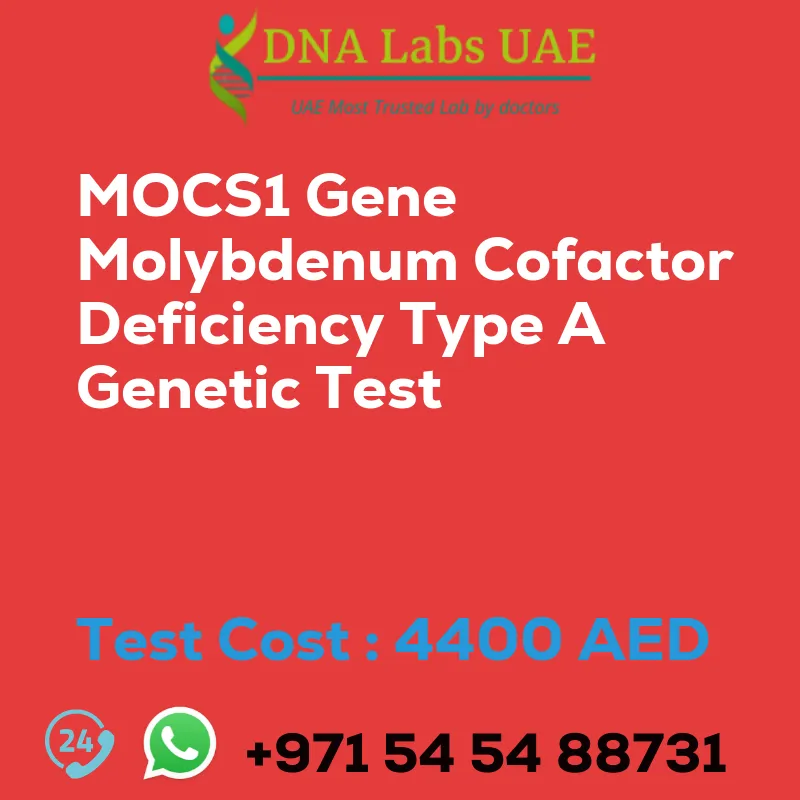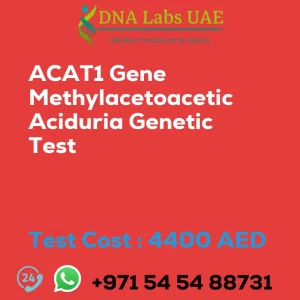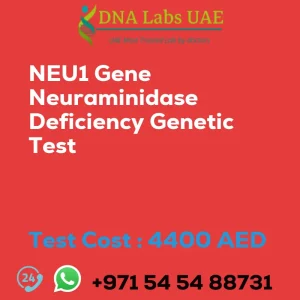MOCS1 Gene Molybdenum Cofactor Deficiency Type A Genetic Test
At DNA Labs UAE, we offer the MOCS1 Gene Molybdenum Cofactor Deficiency Type A Genetic Test. This test is designed to diagnose molybdenum cofactor deficiency type A, a rare genetic disorder. The test utilizes NGS (Next-Generation Sequencing) technology to analyze the MOCS1 gene and identify any genetic variations or mutations that may be causing the condition.
Test Components and Price
- Components: MOCS1 Gene Molybdenum Cofactor Deficiency Type A Genetic Test
- Price: 4400.0 AED
Sample Condition
The test requires a blood sample, extracted DNA, or one drop of blood on an FTA card.
Report Delivery
After the sample is received, the report will be delivered within 3 to 4 weeks.
Method
The test utilizes NGS technology to analyze the MOCS1 gene.
Test Type
The MOCS1 Gene Molybdenum Cofactor Deficiency Type A Genetic Test falls under the category of metabolic disorders.
Doctor
This test can be ordered by a general physician.
Test Department
The MOCS1 Gene Molybdenum Cofactor Deficiency Type A Genetic Test is performed by our Genetics department.
Pre Test Information
Prior to the test, it is important to provide the clinical history of the patient. Additionally, a genetic counseling session may be conducted to draw a pedigree chart of family members affected by molybdenum cofactor deficiency type A.
Test Details
Molybdenum cofactor deficiency type A is a rare genetic disorder characterized by the inability to produce a functional molybdenum cofactor. This cofactor is essential for the proper functioning of several enzymes in the body. The MOCS1 Gene Molybdenum Cofactor Deficiency Type A Genetic Test utilizes NGS technology to identify any genetic variations or mutations in the MOCS1 gene that may be causing the condition.
The test not only aids in diagnosing the condition and determining the specific genetic cause but also provides valuable information for genetic counseling and family planning. It can also identify carriers of the MOCS1 gene mutation who may be at risk of passing the condition to their children.
It is important to note that NGS genetic testing requires a DNA sample, typically obtained through a blood or saliva sample. It is recommended to have the test performed by a qualified healthcare professional or genetic testing laboratory. The interpretation of the test results should be done by a healthcare professional specializing in genetics.
| Test Name | MOCS1 Gene Molybdenum cofactor deficiency type A Genetic Test |
|---|---|
| Components | |
| Price | 4400.0 AED |
| Sample Condition | Blood or Extracted DNA or One drop Blood on FTA Card |
| Report Delivery | 3 to 4 Weeks |
| Method | NGS Technology |
| Test type | Metabolic Disorders |
| Doctor | General Physician |
| Test Department: | Genetics |
| Pre Test Information | Clinical History of Patient who is going for MOCS1 Gene Molybdenum cofactor deficiency type A NGS Genetic DNA Test A Genetic Counselling session to draw a pedigree chart of family members affected with Molybdenum cofactor deficiency type A |
| Test Details |
The MOCS1 gene is associated with molybdenum cofactor deficiency type A, which is a rare genetic disorder. Molybdenum cofactor deficiency type A is characterized by the inability to produce a functional molybdenum cofactor, which is necessary for the proper functioning of several enzymes in the body. NGS (Next-Generation Sequencing) genetic testing is a type of genetic test that uses advanced sequencing technologies to analyze multiple genes simultaneously. In the case of MOCS1 gene testing, NGS can be used to identify any genetic variations or mutations in the MOCS1 gene that may be causing molybdenum cofactor deficiency type A. This type of genetic testing can help in diagnosing the condition, determining the specific genetic cause, and providing information for genetic counseling and family planning. It can also be used to identify carriers of the MOCS1 gene mutation who may be at risk of passing the condition to their children. It’s important to note that NGS genetic testing requires a DNA sample, typically obtained through a blood or saliva sample, and should be performed by a qualified healthcare professional or genetic testing laboratory. The results of the test should be interpreted by a healthcare professional who specializes in genetics. |








